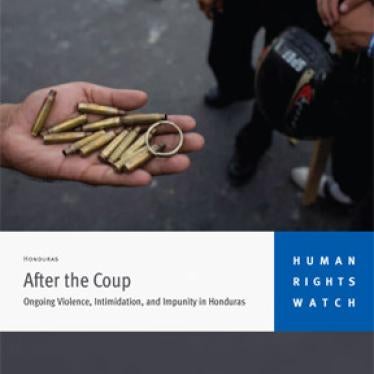(Washington, DC) - Honduran authorities should conduct a prompt, thorough, and impartial investigation into allegations of excessive use of force by police to disperse teachers union demonstrations in Honduras and prosecute anyone found responsible, Human Rights Watch said today.
Since mid-March 2011, demonstrations by teachers' unions protesting proposed changes in the public education system have ended in violent confrontations with the police. Human Rights Watch has received credible reports that members of the national police have used excessive force against protesters, firing teargas canisters indiscriminately and beating people with batons. Some protesters have reportedly attacked the police with bottles, rocks, and Molotov cocktails, injuring at least four officers.
"Human Rights Watch recognizes that Honduran police have a duty to respond to protesters who engage in violence and prosecute those who break the law," said José Miguel Vivanco, Americas director at Human Rights Watch. "But they also have an obligation to respect the basic rights of demonstrators."
Sandra Ponce, the head of the human rights unit at the Attorney General's Office, told Human Rights Watch that her unit had "verified a pattern of excessive use of force" by police. News media reported that Ramón Custodio, the national human rights ombudsman, and Ana Pineda, the human rights minister, have also questioned the use of force by the police against the demonstrators.
Local human rights organizations reported that police officers beat demonstrators and threw tear gas bombs "indiscriminately" at them, including the following cases:
- On March 18, Ilse Velázquez Rodríguez, a teacher and member of a human rights organization, passed out after allegedly being hit on the forehead by a teargas bomb. A few minutes later, she was run over by a car and died.
- On March 18, police officers allegedly beat a union leader, Adalid Romero, on his head with batons, resulting in serious injuries.
- On March 28, police and military officers allegedly beat Mirian Miranda, a human rights defender from the Garifuna community. The officers allegedly locked her in the trunk of a police car for several hours, and then took her to a police station. She was released after 12 hours.
In addition, the police targeted five journalists covering the protests, according to C-Libre, a local organization monitoring press freedom in Honduras. It reported that on March 21, police officers fired rubber bullets at Uriel Rodríguez, a cameraman from Globo TV, and tried to seize a camera from Sandra Maribel Sánchez, director of Radio Galcho. On March 22, police officers threw teargas canisters at the car of two journalists who were talking to protesters - David Romero, director of Radio Globo, and Lidieth Díaz, a reporter for Canal 36. On March 25, Richard Cásula from Canal 36 was injured when he was hit by a tear gas canister.
Human Rights Watch urged President Porfirio Lobo to instruct state security forces that abusive treatment will not be tolerated under any circumstances, and to make clear that officers of all ranks who are responsible for such practices will face disciplinary action, including loss of their jobs and criminal prosecution. He should ensure that police officers prosecuted for alleged crimes are immediately suspended from duty.
"If President Lobo is committed to law and order, he should ensure that alleged brutality by the police is thoroughly investigated and that those responsible are prosecuted and held accountable," Vivanco said.







